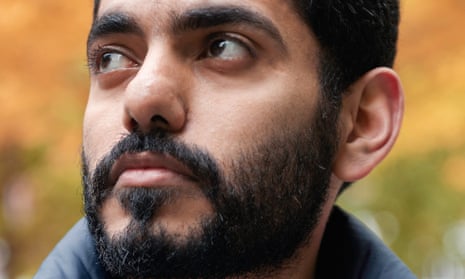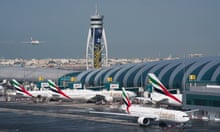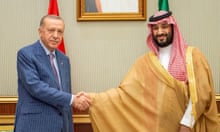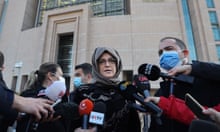For Omar Abdulaziz, a 27-year-old Saudi dissident living in exile in Canada, the murdered journalist Jamal Khashoggi was more than a prominent columnist and veteran who knew the ins and outs of the Saudi royal court. He was a mentor and father figure.
Abdulaziz, who often lambasts the Saudi leadership and the crown prince, Mohammed bin Salman, in online videos that garner a huge following, cannot see his parents, who still live in the kingdom. Khashoggi was also forced to live abroad, without his children.
So when Abdulaziz learned of the journalist’s fate – his brutal killing in the Saudi consulate in Istanbul – he broke down. But he now takes solace in what Khashoggi has achieved in death.
“The idiots wanted to silence his voice,” he says. “But they made way for a thousand other voices.”
It is now nearly two months since Khashoggi, a columnist for the Washington Post, disappeared inside the consulate. Turkish prosecutors say he was attacked on entering the building and strangled, his body dismembered and destroyed. His corpse has not been found, but Turkish officials identified more than a dozen Saudi operatives who travelled to Istanbul and allegedly took part in a premeditated assassination.
Saudi officials have acknowledged the killing, and have said they will pursue the death penalty for five suspects charged with ordering and carrying it out. But they insist it was the work of a rogue cell that went beyond instructions to bring back Saudi dissidents from around the world. Some of the suspects, and top intelligence officials who were ousted in the aftermath, are close to the crown prince, but officials insist that he had no knowledge of the operation. The CIA believes otherwise, however, reportedly concluding that Prince Mohammed ordered the assassination.
The murder has sparked global outrage and damaged the reputation of a leader who had billed himself as a reformer eager to modernise Saudi society but has cracked down on activists and opponents at home. The killing was particularly disturbing to Abdulaziz because, aside from his personal grief, there were chilling parallels with his own life.
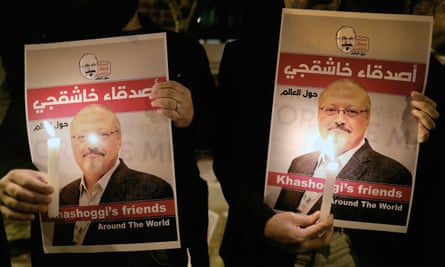
In May this year, two Saudi officials met him in Montreal, bringing along his brother, and urged him to work with the authorities. In the conversations, which Abdulaziz recorded, the officials invited him to renew his passport at the Saudi consulate. When he went back and listened to them after Khashoggi’s murder, he was stunned.
He declined the offer, but a month later his phone was hacked, and his conversations with Khashoggi were intercepted. They concerned an “army of bees” project to recruit volunteers to counter Saudi state disinformation and propaganda on social media. The hacking was confirmed by the Citizen Lab, an outfit at the University of Toronto that studies digital espionage.
For now, Abdulaziz and other activists are mourning Khashoggi’s death. But he says they do not feel frightened. The journalist’s killing has refocused attention on human rights abuses in the kingdom, the disastrous war in Yemen and the parallel intolerance of any form of dissent.
“Today in Saudi Arabia, if you are not a megaphone [for the government], you will be detained,” he says. “Silence is no longer enough.”
He is particularly concerned about those detained at home, including his two brothers and several friends who are imprisoned for their links to him. “If they did this to Jamal Khashoggi, how do they deal with the others?” he asks.
Abdulaziz applied for asylum in 2014, when his student scholarship was cancelled after he criticised the Saudi government. He initially criticised Khashoggi also, for refusing to invite Saudi dissidents on to a TV station that he launched in 2015.
But Abdulaziz was one of the first activists to back Khashoggi when the older man left the kingdom to live in exile in 2017. They began working together on various initiatives.
Abdulaziz recognised Khashoggi’s potential as a figure that the “silent majority” would listen to. The Saudi journalist did not refer to himself as a dissident, nor did he wish for the overthrow of the monarchy, but instead sought a moderate middle ground between loyalism and opposition, one that Abdulaziz said was desperately needed in the discourse surrounding the oil-rich kingdom.
More frightening to the government, Abdulaziz says, was Khashoggi’s attempt to create institutions and do civil society work abroad.
“Yes, the Washington Post columns were frightening,” he says. “It’s like Mohammed bin Salman writing on a blackboard and Jamal Khashoggi would erase it in the night, with one column.”
“The government realised this man was transforming the work abroad into institutional work, and that’s what was missing from the Saudi opposition. There is no civil society.”
Riyadh’s shifting narrative of what happened to Khashoggi has hurt its credibility, Abdulaziz says, prompting more people to seek out other voices.
“Today Saudi activists are stronger, and their voices are heard,” he says. “I think now, the silent majority believes in what we say, and thinks the regime is lying. The mask has fallen and the ugly, murderous, thuggish, cowardly image has been shown.”
